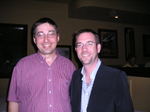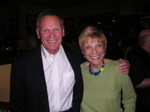Author John Barlow writes for Slate about the agony of writing a book for 17th Street Productions, the book packager behind Kaavya Viswanathan’s controversial novel and a number of other hit teen novels.
However, having never lived in the United States, I had no idea about what
was permissible in terms of cussing, especially in kids’ fiction. We had agreed,
previously, that I would write the thing as naturally as I could, and the people
at 17th Street would filter out the unacceptable elements. So, I did just that,
leaving in the text a modest fistful of shits, craps, a
bastard, and several fucks. I even told them so when I mailed
the finished text. Did they filter? Did they read? No; they gave the manuscript
straight to the 8-year-old son of the company president. Little Timmy saw a
shit and a fuck. He cried. He read the word bastard
and needed counseling. It was a catastrophe.My 80,000 words were dead words. A book that I love never got published. Or
even edited. Or read by a single kid (apart from Timmy). I blew it. My chance of
Harry Potterdom, of country homes, of cars that start every time, of book
signings where enough people come to form an actual line … all down the drain.
However, it was a great way to learn that you can’t write a book by committee,
and to be paid 10 grand to learn it. So, thank you Sweet Valley boys. It was
great fun, really.
I know I’m supposed to read this and side with the author…but, I have to say, my sympathies are with the book packager. Maybe because I’ve written so many television shows (where I get input from a thousand people) and work-for-hire tie-in novels. Maybe because I’m a complete sell-out and a talentless hack. Whatever the reason, this guy strikes me as an unprofessional, self-destructive, whiny putz. He couldn’t bring himself to do some minimal preparation like, oh, actually read some other books from the packager…or other books in the same genre. He was an artist. He was following his muse instead of doing the job he was hired to do.
Barlow implies in his article that the disasterous experience is all his (then) agent’s fault for getting him into a deal with a bunch of talentless suits. But the truth is that the fault is entirely his own. What killed the deal wasn’t the class between his high, artistic standards and their gutlessness and lack of taste. What killed it was Barlow’s ego, laziness and astonishing lack of professionalism.





